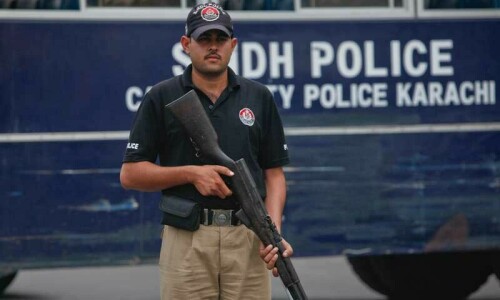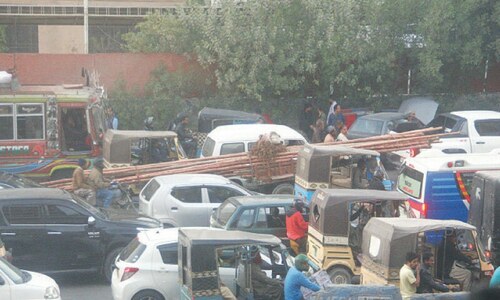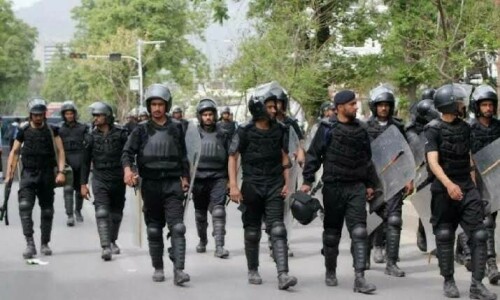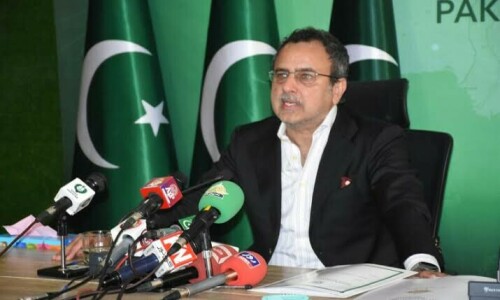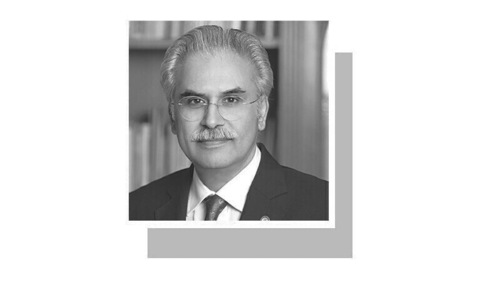KARACHI: Political parties in Sindh warned the federal government on Thursday that any attempt to roll back the 18th Constitutional Amendment could lead to dangerous consequences for the federation and weaken the already struggling democratic system of the country.
At a time when the country is facing multiple crises amid the increasing coronavirus cases, they questioned the fresh debate on the 18th Amendment, calling both the federal and provincial governments to focus on measures to save people’s lives.
The political leaders representing different ideologies unanimously supported the provincial governments for their rights under the 18th Amendment.
These thoughts were highlighted at a multiparty conference organised by the ruling Pakistan Peoples Party (PPP) at the CM House. It was also attended by Sindh Chief Minister Syed Murad Ali Shah and key members of his cabinet as part of its nationwide campaign to build political consensus on the 18th Amendment and seek consensus for unanimous policies over the challenges that emerged after the Covid-19 outbreak.
Sindh govt’s performance, policies also criticised
The conference, presided over by PPP Sindh president Nisar Ahmed Khuhro, was attended by all major parties, including the Muttahida Qaumi Movement-Pakistan (MQM-P), Pakistan Muslim League-Nawaz (PML-N), Jamaat-i-Islami, Awami National Party, Jamiat Ulema-i-Islam of Maulana Fazlur Rahman (JUI-F), Jamiat Ulema-i-Pakistan-Noorani (JUP-N), Shia Ulema Council, Sunni Tehreek, Pak Sarzameen Party, Sindh Taraqqi-pasand Party and others.
The Grand Democratic Alliance and the Pakistan Tehreek-i-Insaf had announced boycott of the conference.
After the conference, Mr Khuhro addressed the media and shared the resolution passed with consensus by the political parties. He also appreciated the role and spirit of the political parties in Sindh which, he said, despite ideological and political differences showed their mature and democratic character for a strong federation.
National Finance Commission
“The conference supported the Sindh government’s apprehension on the recently-constituted National Finance Commission (NFC) and warned that such a move would badly affect the country’s national unity and social fabric, while demanding withdrawal of the fresh orders and reconstitution of the body,” Mr Khuhro said.
“The conference agreed that the government is proving that it doesn’t support provincial autonomy and economic stability of the provinces,” he said. “The fresh debate and controversial statement from the top suggest there’s a strong desire to introduce the one-unit system. The mature political leadership of this country, represented in the conference, said such an approach causes disintegration and weakens the federation.”
The conference, he said, also condemned the decision of the federal government to lay off more than 9,000 workers of the Pakistan Steel Mills before its privatisation. They called the move “against human values” to make people unemployed at the time of pandemic, said Mr Khuhro, vowing that his party in consultation with other political forces would soon devise a strategy to safeguard the workers’ interests and save the industrial giant from privatisation.
Response to Covid-19 spread
The leaders of the political parties also called for immediate measures to face the challenges emerging from the coronavirus outbreak in the country and a strong policy to save the people’s lives. The leaders of different parties, he said, showed their concern over the confusion created by the government, which on one hand appealed to the people to stay at home and on the other reopened the tourism industry.
“The federal government is confused between lockdown and smart lockdown,” said Mr Khuhro. “Here the number of cases is rising every day and the people are dying due to pressure on our health system, but the government is still not clear that what should be its policy. The conference demanded a strong, urgent and uniform policy to meet the emerging challenges.”
During the conference, the PPP government in Sindh also came under criticism when leaders of some parties questioned the performance of the provincial administration in the wake of coronavirus pandemic. They criticised the role of the provincial government mainly during the last three months when it had mostly focused on showing concern to save people’s lives but fell short of taking practical measures.
“It’s so unfortunate that the health system of Sindh has not been able to sustain pressure of just 3,000 patients despite the fact that the PPP is enjoying a third consecutive term in the government,” said JUI-F leader Rashid Soomro. “We support the stance on the 18th Amendment but benefits of such landmark constitutional reforms should be enjoyed by the people. The Sindh government needs to take drastic measures to [bring] its health system at par with the required standards.”
Dissenting notes
The PSP’s national council members Shabbir Kaimkhani and Syed Hafeez-ud-Din, in accordance with the party policy, submitted two dissenting notes in the conference.
The PSP leaders took a firm stand in the first dissenting note that their party did not agree with the PPP’s stance on the 18th Constitutional Amendment. They elaborated that the PSP wanted to make it mandatory for the provinces to issue a provincial finance commission award for the districts in the same manner in which the provinces received the National Finance Commission award from the federal government. Likewise as provinces have provincial autonomy, districts and cities should be given autonomy.
The MQM-P also came up with its thoughts and its leaders said the 18th Amendment was not beneficial for the people of the province unless Article 140-A of the Constitution was implemented.
Leaders of the MQM-P, an ally of the PTI government in the centre, said powers transferred to the grassroots level were key to utilising the 18th Amendment and until they were transferred to the district level, it would remain ineffective. The PPP’s Sindh government had not been transferring power to grassroots level against its own manifesto of a strong democratic culture.
Published in Dawn, June 12th, 2020


